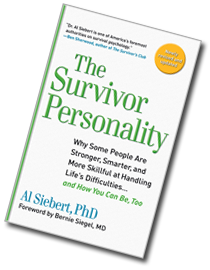The Worst Experiences Create Some of the Best People -- Oprah Winfrey's Story
by Al Siebert, PhD
THRIVEnet Story of the Month - April 1997
Experiences that weaken and crush some people make others stronger and better. Nietzsche knew this about himself. Maslow called the phenomenon his "continental divide theory."
Especially amazing are stories of exceptionally capable, resilient, successful people who survived childhood experiences that no child should have to go through. Oprah Winfrey, for example, was an unwanted, illegitimate baby. Her mother left her with a grandmother who had a pig farm in rural Mississippi and moved away.
For the first six years of her life Oprah felt very lonely. Her grandmother whipped her with a switch almost daily, telling her it was for her own good. She had no contact with her mother. She did not know who her father was. She felt terrified by her grandfather. Adults appreciated her because of her talent for reciting, but "all the kids hated me," she says, "all through school."
When Oprah was six she went to live with her mother in Milwaukee. Oprah did well in school, but her dream of being close to her mother did not happen. Her mother had given birth to another daughter, had a boyfriend she expected to marry, and was working. They lived in a crowded, one-room apartment. Oprah was raped by an older cousin when she was nine. He warned her to not tell anyone so she remained silent. For the next few years many men and boys, including her uncle and other male relatives, had sex with her. When Oprah was fourteen, she was too much for her mother to handle. She was sent to live with her father and stepmother in Nashville. They established strict control over her conduct. They demanded that she remain chaste, that she dress, talk, and act like a lady, and get high grades in school. She did. She credits them with turning her life around.
Oprah's broadcasting career started when she was seventeen. She was asked to work part-time reading the news on a Nashville radio station for $100 a week. She did well and found a career that has become her calling.
When asked about her past, Oprah says "I'm surprisingly healthy, mentally healthy. I never internalized sexual abuse as this awful thing that had happened to me....I'm neither guilty nor angry."
Oprah's experiences taught her that because she was on her own, her success or failure in life was up to her. This is an attitude that guides her and is what she communicates to others. "One of my main goals on this planet," she says, "is to encourage people to empower themselves."
About her own life she says:
"Rather than complain about television and get upset about it and angry, I decided I'd start changing it myself. The way to change is to prove that people will respond to good work. If you give people something good to watch, if you uplift them, enlighten them, as well as entertain them, they will respond to it. That's just part of the spirit."
Oprah is an excellent role model of someone with survivor personality traits. Her childhood experiences, instead of making her an impaired, unwed mother living on welfare, developed in her an incredible range of strengths. She has amazing self-confidence, trusts her intuition, reads people well, is very open and self-disclosing, has a playful, humorous nature, is both creative and organized, does things her own way, takes risks trying new things, and keeps getting better and better every year. During my time with her I saw that she is very centered and quietly aware of everything happening around her.
Even though Oprah is very self-reliant, she attracts excellent people to work with her. She is a highly synergistic person. She is interacting with the world in a way that is leading to things working better for millions of people. And she does this earning an excellent income. As Maslow observed about highly self-actualized people, she has blended the selfish-unselfish dichotomy in a way that makes her very powerful.
I agree with Oprah's self observation about being surpisingly mentally healthy. She definitely is. And she is an outstanding example of how some of the very best people in our world have been through some of the worst experiences.
REFERENCES:
- "About Us: The Dignity of Children," ABC TV Special, 3/29/97.
- Lanker, Brian, I Dream A World: Portraits of Black Women Who Changed America, Stewart, Tabori & Chang, New York: 1989. p. 66 (ISBN: 1-55670-063-6).
- Mair, George, Oprah Winfrey: The Real Story, Citadel Stars, Secaucus, NJ: 1994, 1996. (ISBN: 1-55972-250-9).
